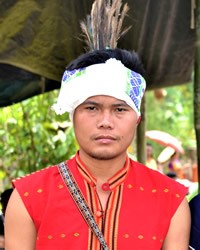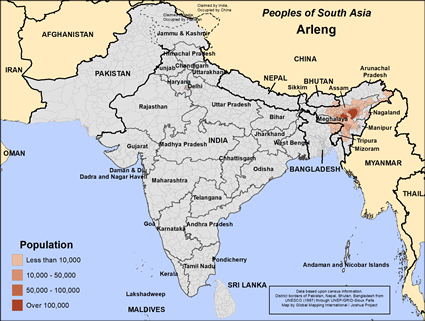The Arleng people live in the northeastern regions of India and parts of Bangladesh. Their history traces back to ancient times when they migrated to the hill regions, where they established their communities. The Arleng have traditionally engaged in shifting cultivation, a practice that has sustained them for generations. Over time, they have navigated various socio-political changes, including the impacts of colonization and the subsequent redrawing of national borders, which has led to their presence in both India and Bangladesh. Far more of them live in northeastern India than in Bangladesh.
The Arleng people primarily engage in agriculture, practicing shifting cultivation, also known as jhum farming, where they grow crops like rice, millet and vegetables. Many also collect forest products, which they use for both sustenance and trade. Their villages are typically located in hilly or forested areas, with homes made from bamboo, wood and thatch.
Social life revolves around the extended family and village community, with collective activities playing a crucial role in their daily lives. Access to education remains limited, particularly in more remote areas, resulting in low literacy rates. Healthcare services are also scarce, often leading to reliance on traditional medicine.
The Arleng people practice a blend of animism and Hinduism. They believe in spirits associated with nature, including those inhabiting forests, rivers and mountains and conduct rituals to appease these spirits and protect their communities. Hindu deities are also worshiped, particularly those linked to agriculture and fertility. Festivals and ceremonies are central to their spiritual life, involving the entire community in rites that honor both their ancestral spirits and Hindu gods. This blend of animist and Hindu beliefs reflects their adaptation to external religious influences while preserving their traditional practices.
The Arleng people face significant challenges related to economic development, education and healthcare. Many continue to rely on subsistence farming, with limited access to markets and alternative income opportunities. Educational facilities are often inadequate, leading to low literacy levels and limited access to formal education. Healthcare remains a major concern, particularly in rural and remote areas, where medical services are minimal and often inaccessible. Infrastructure improvements, such as better roads, clean water supply and access to electricity are crucial to enhancing their quality of life. Programs focusing on sustainable livelihoods, education and healthcare access are essential for the long-term development of the Arleng people.
Pray that the Lord will lead today's workers to Arleng religious people who are sincerely looking for truth and righteousness and lead them to the blessings that only Jesus can offer. Pray that the Arleng people will seek and find Christ, so that many will come together to study his word and tell of his glorious mercy to those from other parts of South Asia.
Scripture Prayers for the Arleng in Bangladesh.
Northeast India Studies. (2023). Ethnographic Overview of the Arleng People. Retrieved from northeastindiastudies.org
UNDP India and Bangladesh. (2023). Development Needs of Tribal Communities in India and Bangladesh. Retrieved from in.undp.org
| Profile Source: Joshua Project |













